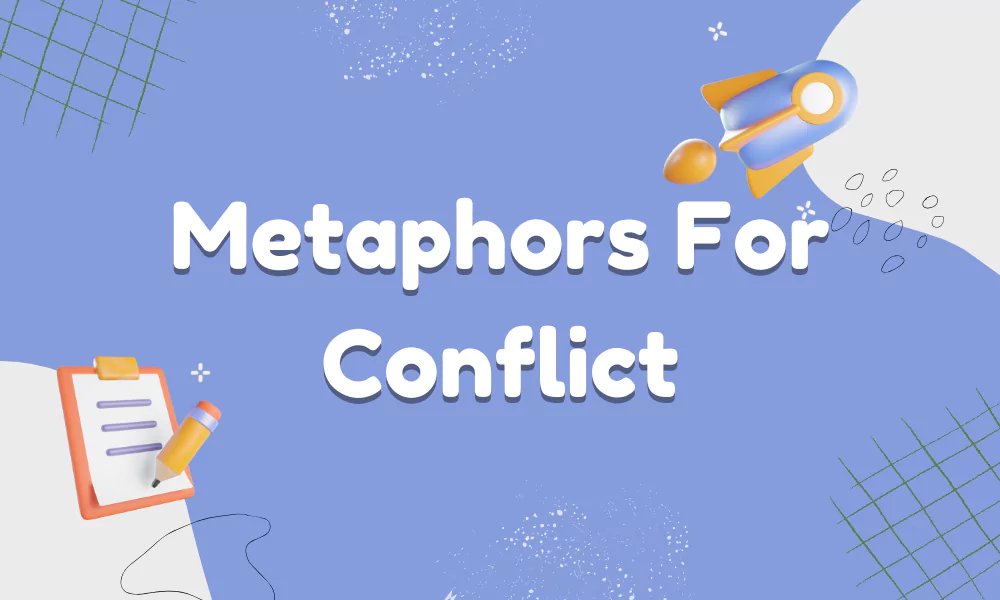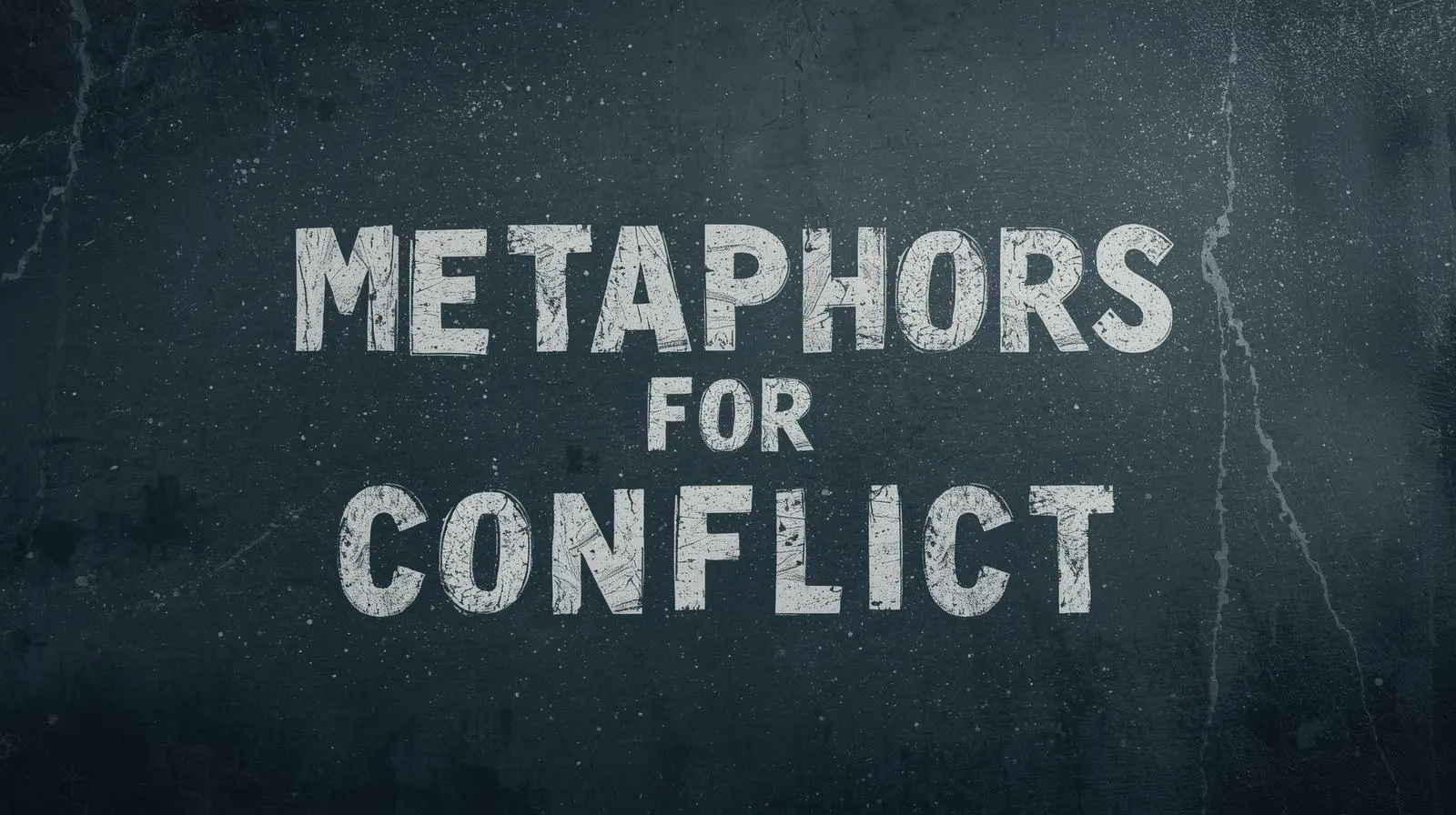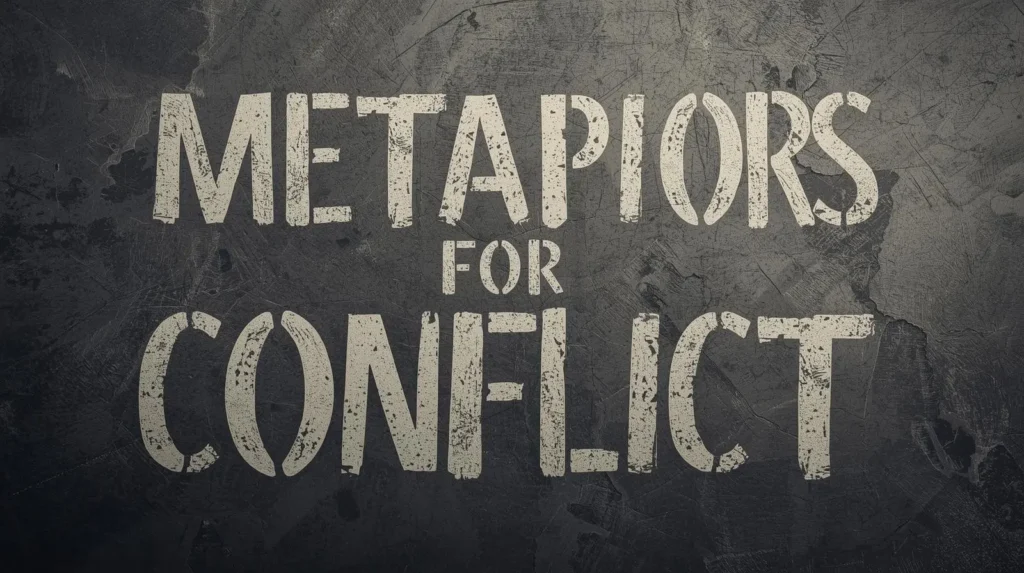Metaphors for Conflict – Powerful Examples to Describe Tension and Struggle

Conflict can feel like a storm brewing inside or a battlefield unfolding before our eyes like chaotic, emotional, and full of movement. It’s an inevitable part of life, yet often difficult to explain in plain words. That’s where metaphors come in. Metaphors act like mirrors, reflecting the true essence of conflict through vivid images and relatable experiences. They help us see tension not just as disagreement, but as waves colliding in a stormy sea, a tug-of-war of emotions, or even a wildfire that spreads if left unchecked.
What Are Metaphors for Conflict?
Conflict metaphors are imaginative comparisons that describe disagreements, struggles, or tensions through vivid and relatable images. Instead of saying “two people are arguing,” a metaphor might say “they’re in a tug-of-war” or “a storm is brewing.” These expressions paint a clearer picture of the emotions, intensity, and dynamics involved in conflict. By using metaphors, writers and speakers can make complex situations easier to understand, highlight the causes or effects of conflict, and even suggest ways to resolve it more thoughtfully.

Everyday Metaphors for Conflict
- Stormy Sea – Conflict is rough and unpredictable.
Example: Their argument felt like sailing through a stormy sea. - Tug-of-War – Both sides pulling in opposite directions.
Example: The meeting turned into a tug-of-war of opinions. - Clash of Titans – A battle between powerful forces.
Example: The two leaders’ debate was a clash of titans. - Boiling Pot – Tension building up, ready to overflow.
Example: The office was a boiling pot waiting to explode. - Fire and Fuel – One thing intensifies the other.
Example: His harsh words added fuel to the fire. - Cold War – Silent but ongoing tension.
Example: After their fight, a cold war began at home. - Battlefield – A place of confrontation and struggle.
Example: The courtroom became a battlefield of arguments. - Knife’s Edge – A situation that could go either way.
Example: Their relationship balanced on a knife’s edge. - Explosive Volcano – Anger or tension bursting out suddenly.
Example: He erupted like a volcano after hearing the news. - Iceberg Underwater – Hidden issues beneath the surface.
Example: Their disagreement was just the tip of the iceberg. - Tightrope Walk – Trying to maintain balance during tension.
Example: Managing both teams was like walking a tightrope. - Locked Horns – Engaged in a fierce struggle.
Example: The politicians locked horns over the new policy. - Burning Bridge – Destroying connections through conflict.
Example: His harsh comments burned every bridge behind him. - Crossfire – Caught between opposing sides.
Example: The manager was caught in the crossfire of two departments. - Earthquake – A sudden shake that disrupts everything.
Example: Their breakup hit the family like an earthquake. - Game of Chess – Strategic and cautious opposition.
Example: Negotiations turned into a slow game of chess. - Storm Cloud – Signs of an approaching problem.
Example: A storm cloud hung over their friendship for weeks. - Wildfire – Spreading rapidly and uncontrollably.
Example: Rumors spread like wildfire, creating tension everywhere. - Broken Mirror – Shattered trust or understanding.
Example: Their friendship was a broken mirror that couldn’t be fixed. - Tangled Web – Complicated and messy conflict.
Example: Lies created a tangled web of resentment. - Wall Between Us – Emotional distance due to tension.
Example: After the argument, a wall stood between them. - Pressure Cooker – Built-up stress ready to explode.
Example: The office felt like a pressure cooker before deadlines. - Shadow Battle – A silent, indirect struggle.
Example: They were fighting a shadow battle through passive remarks. - Wounds and Scars – Emotional pain from conflict.
Example: The fight left deep wounds that took time to heal. - Raging Storm – Overwhelming emotions and chaos.
Example: Their fight turned into a raging storm of accusations. - Chessboard of Power – Strategic moves in conflict.
Example: Politics is a chessboard of power and rivalry. - Thunderclap – A sudden outburst.
Example: His angry response hit like a thunderclap. - Cracked Foundation – Weakening trust or unity.
Example: Their partnership showed cracks in the foundation. - Heat of Battle – The most intense part of conflict.
Example: In the heat of battle, both forgot their main goal. - Open Wound – Pain that remains unresolved.
Example: The argument was an open wound that wouldn’t heal. - Minefield – Danger at every step.
Example: Discussing politics with them is like walking through a minefield. - Rope Pull – Struggling for control.
Example: The siblings were in a rope pull over inheritance. - Blazing Fire – Anger consuming everything.
Example: His fury was a blazing fire that burned every apology. - Frozen Wall – Cold and silent tension.
Example: A frozen wall of silence stood between them. - Knife Fight in the Dark – A conflict without clarity.
Example: The negotiation was like a knife fight in the dark. - Ripple Effect – Conflict spreading outwardly.
Example: Their quarrel caused a ripple effect in the whole team. - Broken Chain – Disconnection due to conflict.
Example: The disagreement broke the chain of trust between them. - Thunderstorm – Emotional outburst that soon passes.
Example: Their fight was just a thunderstorm, it blew over quickly. - Maze of Misunderstandings – Complex and confusing disputes.
Example: They were lost in a maze of misunderstandings. - Bridge on Fire – Burning all chances of reconciliation.
Example: His harsh words left the bridge on fire between them.
Cultural & Literary Metaphors for Conflict
- David vs. Goliath – A small opponent facing a much stronger one.
Example: The startup’s lawsuit against the tech giant was a David vs. Goliath battle. - Pandora’s Box – Once opened, it unleashes many troubles.
Example: Discussing old issues opened a Pandora’s box of emotions. - Achilles’ Heel – A small weakness that causes downfall.
Example: His pride was his Achilles’ heel in every argument. - Trojan Horse – Hidden conflict disguised as friendship.
Example: Their offer of help turned out to be a Trojan horse. - Cain and Abel – Deep personal or family conflict.
Example: Their rivalry resembled the story of Cain and Abel. - Sword of Damocles – A threat hanging overhead during tension.
Example: The possibility of job cuts was a Sword of Damocles for the team. - Battle of Wills – Clash of determination or ego.
Example: Their divorce became a long battle of wills. - Greek Tragedy – Conflict leading to inevitable downfall.
Example: Their love story turned into a Greek tragedy. - Romeo vs. the World – Struggle between love and society.
Example: It was a Romeo vs. the world kind of conflict, love defying norms. - The Tempest Within – Shakespearean image of inner turmoil.
Example: She fought the tempest within her heart every day.
Creative & Modern Metaphors for Conflict
- Wi-Fi Outage – Symbol of broken communication or disconnection.
Example: After their argument, their friendship felt like a Wi-Fi outage, no signal, no connection. - System Crash – Emotional or mental breakdown caused by overload.
Example: The constant tension led to a system crash, neither of them could process the situation calmly. - Social Media Storm – A chaotic and public argument online.
Example: Their minor disagreement turned into a social media storm overnight. - Firewall Battle – Emotional defense mechanisms clashing..
Example: They built emotional firewalls so high that every talk turned into a firewall battle. - Frozen Screen – Conflict causing emotional standstill or silence.
Example: The room fell silent like a frozen screen after too many errors. - Broken Algorithm – Miscommunication or misunderstanding patterns.
Example: Their friendship felt like a broken algorithm, whatever they tried just didn’t compute anymore. - Power Outage – Loss of control, clarity, or emotional energy.
Example: After days of arguing, there was a power outage in their relationship; no spark left to continue. - Echo Chamber – Conflict where both sides only hear themselves.
Example: The debate became an echo chamber of stubborn voices, not a real conversation. - Glitched Reality – Distorted perception caused by emotional confusion.
Example: After the fight, everything felt off, like living in a glitched reality. - Overloaded Circuit – Too much emotional charge leading to burnout.
Example: His patience was an overloaded circuit, one more argument and he would explode.
Read: Metaphors for Music

Synonyms of Conflict
| Synonym | Meaning |
|---|---|
| Dispute | A disagreement or argument between two or more sides. |
| Clash | A direct confrontation between opposing forces or ideas. |
| Struggle | A prolonged effort or fight to achieve or resist something. |
| Battle | A fight or contest between opposing parties. |
| Tension | A state of mental or emotional strain caused by opposition. |
| Discord | Lack of harmony or agreement. |
| Friction | Minor but continuous disagreement or resistance. |
| Feud | A long-lasting and bitter quarrel. |
| Confrontation | A face-to-face conflict or challenge. |
| Rivalry | Competition or struggle for superiority. |
How to Use Conflict Metaphors in Writing & Speaking
- Show Emotion, Don’t Just Tell It
Use metaphors to visualize emotions rather than stating them.
Example: Instead of saying “they were angry,” write “their words sparked like fire in dry grass.” - Match the Metaphor to the Context
Choose metaphors that suit your theme, use war metaphors for intense debates or nature metaphors for emotional tension. - Use Layers of Meaning
Mix metaphors creatively to show complexity.
Example: “Their calm words hid the storm beneath the surface.” - Avoid Overused Images
Replace clichés like “battle of wills” with fresh ones like “a chess match of emotions.” Originality keeps readers engaged. - Use Metaphors for Resolution Too
Metaphors can also show healing or peace.
Example: “After the storm, calm waters returned to their friendship.”
Read: Metaphors for Happy
Read: Metaphors for Clouds
FAQs
Conclusion
Conflict is a natural part of human life but it challenges us, teaches us, and often shapes who we become. But understanding it doesn’t always have to feel heavy or confusing. That’s where metaphors for conflict play a powerful role. They transform arguments into vivid images like a stormy sea, a tug-of-war, or even a wildfire, making complex emotions easier to grasp and express. By using these metaphors in writing and speaking, we can communicate tension, emotion, and resolution more creatively and clearly.
